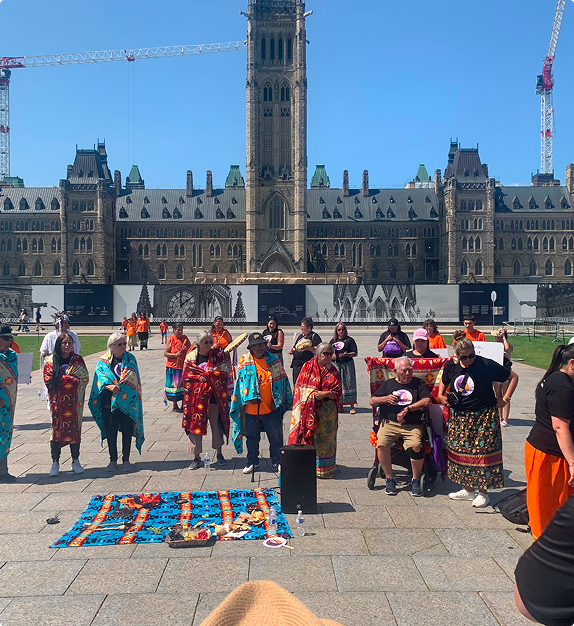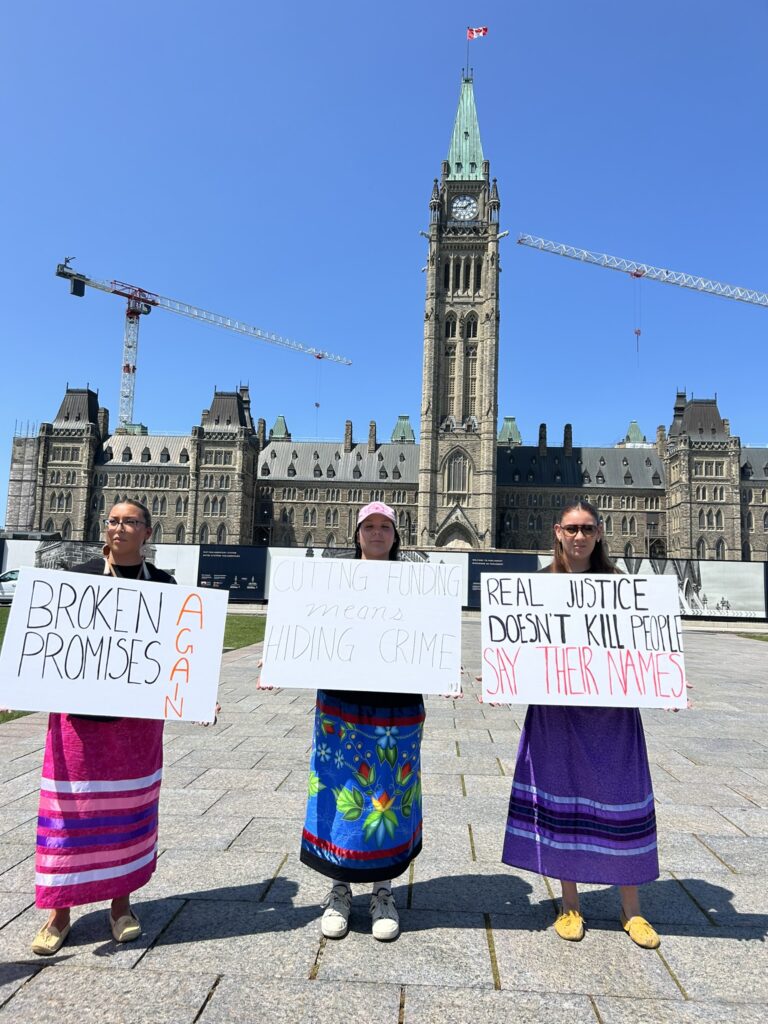The search for missing children and unmarked burials associated with Indian Residential Schools is a complex and emotionally charged undertaking. It is one that demands time, trust, and a wide range of resources. Searching for unmarked burials and missing children is not as simple as turning on ground-penetrating radar technology and getting immediate answers. Every step of this journey, from gathering archival documents, to engaging with Survivors and communities, to conducting ground search efforts and cross-referencing fragmented records, takes time, thoughtful planning, skilled professional, and sustained financial support. This work does not happen in a vacuum. It’s often slowed by bureaucratic hurdles, delayed funding decisions, and the challenge of having to stitch together multiple, incomplete records/data sets. This further complicates the process and adds significant strain on financial resources.
The Secretariat is grateful to have received three-years of federal funding from Crown-Indigenous Relations and Northern Affairs Canada (CIRNAC) for activities occurring in 2021-2024; however, funding for the 2024-2025 fiscal was denied by CIRNAC, citing a surplus that the Secretariat has challenged. This has put the organization into a difficult position, one where the Secretariat has been forced to pause projects, end contracts and reduce staff to ensure it is able to stay afloat.
In this blog, we share how uncertainty around federal funding has impacted our work and what it means for the Survivors, families, and communities still waiting for answers.

2024-2025 Fiscal Year
The Survivors’ Secretariat has been forced to operate without new federal funding for the 2024-2025 fiscal year. While we continue to press to have this decision overturned, we are now waiting for a decision on our application for funding for the 2025-2026 fiscal year.
The Secretariat has been able to continue its work by realigning carry-over funding from the original three-year funding package. This carryover resulted from the final installment of CIRNAC funding being received in December 2023, which was too late to complete planned work for Fall 2023. The realignment of these carryover funds helped support core operational activities occurring throughout the spring and summer of 2024/2025, however, they were fully used by November 2024. Since then, the Secretariat has relied on support from the Province of Ontario and donations from the public to operate while waiting for a decision from the federal government. In January 2024, just two months before the fiscal year ended the federal government denied any new funding, claiming the Secretariat had a $4.1 million surplus. The Secretariat is disputing this reported surplus. As of April 2025, after several letters to CIRNAC, there has been no explanation as to how this surplus was calculated.

2024-2025 Funding Timeline:
Over the past year, there has been a notable shift in the federal government’s commitment to addressing missing children and unmarked burials. This change has directly impacted Indigenous-led organizations like the Survivors’ Secretariat, whose work in this area is critical.
The timeline below outlines key moments and federal decisions that have affected our funding, and by extension, our capacity to fulfill our mission:
- October 2023: Survivors’ Secretariat submits their application to CIRNAC for funding to the Residential Schools Missing Children Community Support Fund, requesting three years (2024-2027) of funding to support our continued work in the following key areas: Research, Commemoration/memorialization and Bringing the Children Home.
- December 2023: Survivors’ Secretariat receives a transfer payment in the amount of $2,499,999 as part of their 2021-2024 CIRNAC/ISC agreement with only 3 months remaining in the fiscal year to utilize the funding.
- January 2024: Patrick Ballay, Director of CIRNAC, advises at the Office of the Special Ine Interlocutor (OSI) Gathering in Iqaluit that Residential School Missing Children and Community Support Fund funding would be ‘sunsetting’ in the 2024/2025 fiscal year. (The term sunsetting could refer to a gradual reduction in funding or an end to the funding in the 2024/2025 fiscal year.)
- February 2024: The Secretariat is informed by CIRNAC that there would be a $3 million a year funding cap to all organizations, and funding would not flow to Survivor organizations until July 2024 at the earliest (3 months into the fiscal year).
- April 2024: 2024 Federal Budget is released and with a reduction in allocation to the Residential Schools Missing Children Community Support Fund from $216.6 million over three years to $91 million over two years.
- June 2024: The Secretariat contacts Prime Minister Justin Trudeau’s office and Gary Anandasangaree, Minister of CIRNAC with concerns about the funding reduction and the proposed $3 million cap. Trudeau’s office referred us to the Minister of CIRNAC office and no immediate response was received.
- July 2024: The federal government announces that funding would now be capped at $500,000 per Survivor organization and that the amount would be split between two streams: $200,000 for research and $300,000 for ground search work. The Secretariat’s Board of Directors travelled to Ottawa to meet with Deputy Minister Valerie Gideon to discuss the funding caps issued by CIRNAC and joined community supporters who rallied on Parliament Hill to oppose the funding cap. The cap would result in an 86% reduction to the Secretariat’s annual operating budget.
- August 2024: Gary Anandasangaree Minister of CIRNAC visits the Survivors’ Secretariat’s office in person to hear our concerns about the funding cap stating he would do what he could to address our concerns.
- August 2024: CIRNAC announces a reversal of the $500,000 funding cap, stating that the lack of flexibility was a mistake. However, this decision did not increase any additional funds to the program, nor was funding allocated to the Survivors’ Secretariat for the 2024/2025 fiscal year.
- September 2024: Survivors’ Secretariat hosts a press conference at Parliament Hill, followed by a rally on the grounds to oppose the reduction in funding for unmarked burials associated with IRS investigations nationwide. Survivors released their report titled “A Time for Truth”, followed by a Stand with Survivors social media campaign to help garner support for these investigations.
- November 2024: CIRNAC challenges the Secretariat’s audits over the last three years, by requesting a resubmission of every quarterly and semi-annual report. The Secretariat provides this report on November 28, 2024. At the same time, they advise CIRNAC that they have exhausted all carry-over funds while awaiting a funding decision for the fiscal year that is now more than half over.
- December 2024: The Secretariat secures $950,000 from the Province of Ontario’s Indigenous Services that allows the organization to stay afloat for the last quarter of the 2024 fiscal year.
- January 2025: Just two months before the fiscal year’s end, the Secretariat receives a five-page letter from CIRNAC stating that no additional funding would be provided for the 2024/2025 fiscal year. The letter claimed that the Secretariat had a $4.1 million surplus, which the Secretariat disputes. A formal response is written asking how CIRNAC arrived at this surplus.
- April 2025: After several follow-ups and communication with CIRNAC, the Secretariat has not received a response regarding the alleged surplus in our funding. To date, no clarification has been provided on how CIRNAC arrived at this surplus.
As of April 2025, the Survivors’ Secretariat remains without federal funding, putting vital programs and ground search efforts at risk. While we have received funding from the Province of Ontari and Heritage Canada, that has allowed select operations to continue, the ongoing uncertainty regarding federal funding has led us to pause/cancel critical initiatives for this upcoming year (2025-2026), including:
- Ground Search: The investigation into unmarked graves, including the Youth Supporting Survivor’s ground search program has been suspended for the 2025 season.
Update – May 2025: We are pleased to share that the 2025 ground search, initially cancelled due to a lack of federal funding, is now moving forward. This important work has resumed thanks to a generous investment from Six Nations Health Services. Their support has made it possible for our team to continue the search for unmarked graves and carry out this vital task of truth and healing. We are deeply grateful for their commitment to community-led efforts and the well-being of Survivors and their families.
- Commemoration Efforts: Projects like the Mohawk Village Memorial Park, designed to honour lost children, are on hold and are at risk of being cancelled if funds are not secured.
- Research on Missing/Disappeared Children: Archival research that could help identify missing/disappeared children and connect critical records has been paused and the focus has shifted to securing and protecting the data we have acquired.
- Staff/Contract Partner Layoffs: The Secretariat had to inform our contracted service providers in January 2024 that their contracts would be paused, and in early January, we notified staff that we would be forced to begin terminating positions due to the lack of federal funding.
- Indigenous Data Sovereignty: Initiatives including the development of a searchable community database that ensures Indigenous communities control their own data has also been paused due to lack of funds.

The past year’s denial of funding and ongoing delays in receiving answers have only deepened Survivors’ concerns about the federal government’s long-term commitment to addressing the legacy of Indian Residential School (IRS).
With many Survivors now in their 60s, 70s, 80s, and 90s, the urgency of providing answers within their lifetimes is critical. The Survivors’ Secretariat has been clear: without adequate and sustained funding, efforts to locate and identify the children who disappeared are at serious risk of remaining incomplete. While some provincial and local support has offered short-term relief, the long-term viability of the Secretariat depends on renewed and meaningful federal commitment.
Despite these funding challenges, the Survivors’ Secretariat remains unwavering in its commitment to Bring the Children Home.
Our next blog (May 2025) will highlight what the Survivors’ Secretariat has been able to accomplish, with limited resources, in the 2024-2025 fiscal year.